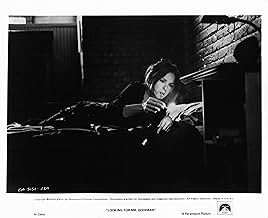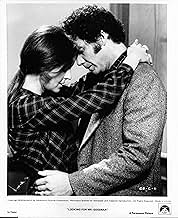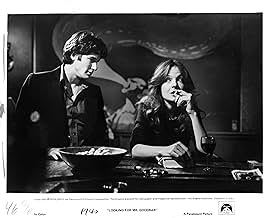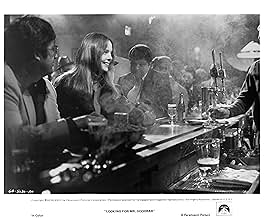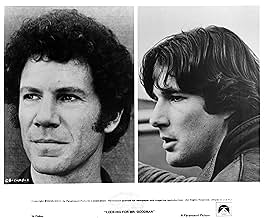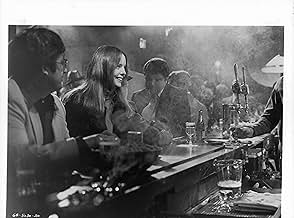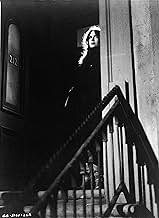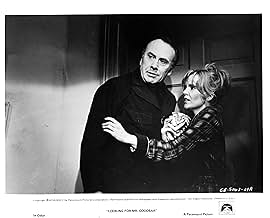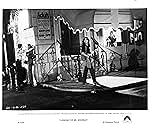IMDb RATING
6.7/10
9.3K
YOUR RATING
Dedicated schoolteacher Theresa Dunn spends her nights cruising bars, looking for males with whom she can engage in progressively dangerous extreme sexual encounters.Dedicated schoolteacher Theresa Dunn spends her nights cruising bars, looking for males with whom she can engage in progressively dangerous extreme sexual encounters.Dedicated schoolteacher Theresa Dunn spends her nights cruising bars, looking for males with whom she can engage in progressively dangerous extreme sexual encounters.
- Nominated for 2 Oscars
- 1 win & 6 nominations total
- Director
- Writers
- All cast & crew
- Production, box office & more at IMDbPro
Featured reviews
Looking For Mr. Goodbar isn't exactly the kind of feel good movie you might want to pop in on a rainy Sunday afternoon. It's heavy - almost suffocatingly so at times. What it does offer is a great chance for Diane Keaton to play a very different kind of character. Her Theresa is nothing like her Annie Hall or Nina Banks and that's refreshing to see. It's also an excellent time capsule of New York City life in the 70's.
With an upbeat 70's disco soundtrack (odds are, you'll know most of the tunes), Looking For Mr. Goodbar tracks a schoolteacher looking for love, passion, and satisfaction anyway she can find it. Sometimes it leads to heartbreak, sometimes it leads to danger, but it always leads to depression for the audience.
It's been a long time since I've seen a film this aggressively depressing and cynical and, to be honest, it's hard for me to process. On one hand, Keaton's work is exceptional, but on the other hand, it's a pretty tough slog to sit through. One needs to be in the right frame of mind to make it through.
With an upbeat 70's disco soundtrack (odds are, you'll know most of the tunes), Looking For Mr. Goodbar tracks a schoolteacher looking for love, passion, and satisfaction anyway she can find it. Sometimes it leads to heartbreak, sometimes it leads to danger, but it always leads to depression for the audience.
It's been a long time since I've seen a film this aggressively depressing and cynical and, to be honest, it's hard for me to process. On one hand, Keaton's work is exceptional, but on the other hand, it's a pretty tough slog to sit through. One needs to be in the right frame of mind to make it through.
Few viewers can deny the impact of this film on the '77 crowd and generations afterwards. As a curious 8-year-old up late watching HBO, I never forgot the story or the lesson. Based on a true story, Richard Brooks astutely translated Judith Rossner's best-selling novel to screen, choosing a luminous Diane Keaton, hot off `Annie Hall' and `The Godfather' to play Theresa Dunn, an up-and-coming Richard Gere, a quirky Tuesday Weld , and amazing Richard Kiley as Dunn, the overbearing Irish-Catholic father. The misogynistic Richard Atherton and an ominous Tom Berenger rounds out the solid cast.
Neither traditionally beautiful like her stewardess sister, Katherine or a baby factory like her other sister living at home with her, Theresa is the odd one out, the sister who is searching for approval from a father who barely acknowledges her existence. Childhood traumas mold her and make the fact that Theresa allows herself to be strong and fallible all the more powerful and endearing.
Tired of her father's unyielding rule, Theresa moves into the apartment building owned by Katherine's next attempt at a husband. As the women's freedom movement is underway, Theresa is caught in the position of questioning the traditional roles for women, roles against a new woman in control of her body and her sexuality. By day she teaches at a school for the deaf. By night her nightly jaunts into New York's seamier nightlife scene, expose the dichotomy of being a professional woman by day who must maintain credibility and responsibility, especially with young children while trying to be sexually active, experimental and suffering the stigma attached to both as whore and as a free woman wanting purely physical experiences much the same as men, yet realizing the label is different.
Throughout this film, Brooks explores Theresa's perpetual search for acceptance by men but a need to maintain her own identity. From a failed affair with a Prof. she was a TA to, to her fling with Tony, a local hustler, Theresa is perpetually in question of her sexuality and her allure for men, making poor choices in her partners only to endure their violence and possessiveness - much like her father. That she meets up with a homicidal drifter the New Year's Eve night she has decided to quit drugs and cruising, is the irony of her self-discovery.
The only positive male in her life appears to be is LaVar Burton's character, Cap Jackson, the sullen brother of one of Theresa's students. He is the only male presence in the movie that is not malevolent or trying to extract something from Theresa and during her altercation with Tony at the school, he is the only person to defend and protect her.
While the scare of AIDS stole later generations' promiscuity, this tale still resonates for viewers, especially for women on their own, looking for intimacy yet craving isolation.
While the ending tends to drag with one too many drug scenes the movie still packs a wallop for a finale.
Neither traditionally beautiful like her stewardess sister, Katherine or a baby factory like her other sister living at home with her, Theresa is the odd one out, the sister who is searching for approval from a father who barely acknowledges her existence. Childhood traumas mold her and make the fact that Theresa allows herself to be strong and fallible all the more powerful and endearing.
Tired of her father's unyielding rule, Theresa moves into the apartment building owned by Katherine's next attempt at a husband. As the women's freedom movement is underway, Theresa is caught in the position of questioning the traditional roles for women, roles against a new woman in control of her body and her sexuality. By day she teaches at a school for the deaf. By night her nightly jaunts into New York's seamier nightlife scene, expose the dichotomy of being a professional woman by day who must maintain credibility and responsibility, especially with young children while trying to be sexually active, experimental and suffering the stigma attached to both as whore and as a free woman wanting purely physical experiences much the same as men, yet realizing the label is different.
Throughout this film, Brooks explores Theresa's perpetual search for acceptance by men but a need to maintain her own identity. From a failed affair with a Prof. she was a TA to, to her fling with Tony, a local hustler, Theresa is perpetually in question of her sexuality and her allure for men, making poor choices in her partners only to endure their violence and possessiveness - much like her father. That she meets up with a homicidal drifter the New Year's Eve night she has decided to quit drugs and cruising, is the irony of her self-discovery.
The only positive male in her life appears to be is LaVar Burton's character, Cap Jackson, the sullen brother of one of Theresa's students. He is the only male presence in the movie that is not malevolent or trying to extract something from Theresa and during her altercation with Tony at the school, he is the only person to defend and protect her.
While the scare of AIDS stole later generations' promiscuity, this tale still resonates for viewers, especially for women on their own, looking for intimacy yet craving isolation.
While the ending tends to drag with one too many drug scenes the movie still packs a wallop for a finale.
Looking for Mr. Goodbar is directed by Richard Brooks and Brooks adapts the screenplay from the Judith Rossner novel of the same name. It stars Diane Keaton, Tuesday Weld, William Atherton, Richard Kiley, Richard Gere, Alan Feinstein and Tom Berenger. Music is by Artie Kane and cinematography by William A. Fraker.
Theresa Dunn (Keaton) is a dedicated schoolteacher to deaf children by day, but at night she cruises bars looking for abusive men with whom she can engage in progressively violent sexual encounters.
First off it should be noted that the Judith Rosner novel is based on the real life case of the 1973 murder of New York City schoolteacher Roseann Quinn. Also of note is that Rossner was not enamoured with this filmic adaptation.
What we have here is a tragic tale set in the promiscuous pre AIDS era of 1970s America. It's a bleak observation of the swinging singles scene of the era, providing caution of patriarch pressures, religious suffocation and the dangers of casual encounters for sexual gratification. Is it any wonder the big hitting critics of the time were nonplussed by it?...
The pic generated a lot of buzz for handsome new actor, Richard Gere, even if he does overact, it actually works in context to the brashness of the period. It also introduced Tom Berenger, in what is a frightening portrayal of a very sexually confused man. Tuesday Weld got a Best Supporting Actress Oscar nomination for playing Theresa's sister, which was richly deserved, so much so one wishes she was in the film more.
Yet it's Keaton who absolutely shines here, lifting an overlong picture to greater heights. Proving she had more in her armoury than merely playing kooks, Keaton imbues Theresa with a desperation and loneliness that is shattering for viewing purpose. The whole narrative bites with a crushing inevitability, that the nihilistic back drop can only bring pain and misery, and so it proves.
Richard Brooks should have sliced at lest thirty minutes from the run time, especially given that the "Theresa fantasy sequences" just come off as pointless and take one out of the heartbeat of the story. Yet this is still a fine movie, not one to be cheered up by of course, but poignant, relative and with the real life story at the core, important. 7/10
Theresa Dunn (Keaton) is a dedicated schoolteacher to deaf children by day, but at night she cruises bars looking for abusive men with whom she can engage in progressively violent sexual encounters.
First off it should be noted that the Judith Rosner novel is based on the real life case of the 1973 murder of New York City schoolteacher Roseann Quinn. Also of note is that Rossner was not enamoured with this filmic adaptation.
What we have here is a tragic tale set in the promiscuous pre AIDS era of 1970s America. It's a bleak observation of the swinging singles scene of the era, providing caution of patriarch pressures, religious suffocation and the dangers of casual encounters for sexual gratification. Is it any wonder the big hitting critics of the time were nonplussed by it?...
The pic generated a lot of buzz for handsome new actor, Richard Gere, even if he does overact, it actually works in context to the brashness of the period. It also introduced Tom Berenger, in what is a frightening portrayal of a very sexually confused man. Tuesday Weld got a Best Supporting Actress Oscar nomination for playing Theresa's sister, which was richly deserved, so much so one wishes she was in the film more.
Yet it's Keaton who absolutely shines here, lifting an overlong picture to greater heights. Proving she had more in her armoury than merely playing kooks, Keaton imbues Theresa with a desperation and loneliness that is shattering for viewing purpose. The whole narrative bites with a crushing inevitability, that the nihilistic back drop can only bring pain and misery, and so it proves.
Richard Brooks should have sliced at lest thirty minutes from the run time, especially given that the "Theresa fantasy sequences" just come off as pointless and take one out of the heartbeat of the story. Yet this is still a fine movie, not one to be cheered up by of course, but poignant, relative and with the real life story at the core, important. 7/10
10t2kt2k
My wife has recently came across of a used vinyl somewhere titled "LOOKING FOR MR GOODBAR" MOTION PICTURE SOUNDTRACK and after noticed Diana Ross is listed she bought it for me for the price of... only $1!!! Despite it's almost 30 years old there are no scratches, excellent quality, sounds like new - unbelievable lucky, isn't she? :)
So here are the tracks:
Side 1 1. Theme from "LOOKING FOR MR GOODBAR" (Don't Ask To Stay Until Tomorrow) 1:16 2. Don't Leave Me This Way - Thelma Houston 3:37 3. Lowdown - Boz Scaggs 3:19 4. Machine Gun - Commodores 2:45 5. Love Hangover - Diana Ross 3:47 6. She Wants To (Get On Down) - Bill Withers 3:15 7. Theme from "LOOKING FOR MR GOODBAR" (Don't Ask To Stay Until Tomorrow) (Reprise) 2:24
Side 2 1. Theme from "LOOKING FOR MR GOODBAR" (Don't Ask To Stay Until Tomorrow) (Vocal) - Marlena Shaw 4:08 2. She's Lonely - Bill Withers 5:04 3. Try Me I Know We Can Make It - Donna Summers 4:14 4. Back Stabbers - The O'Jays 3:06 5. Prelude To Love - Donna Summer 6. Could It Be Magic - Donna Summer 6:12
PS: there's no time printed for 2/5 - in fact there's no such track present on the disc but it's listed on the label.
So here are the tracks:
Side 1 1. Theme from "LOOKING FOR MR GOODBAR" (Don't Ask To Stay Until Tomorrow) 1:16 2. Don't Leave Me This Way - Thelma Houston 3:37 3. Lowdown - Boz Scaggs 3:19 4. Machine Gun - Commodores 2:45 5. Love Hangover - Diana Ross 3:47 6. She Wants To (Get On Down) - Bill Withers 3:15 7. Theme from "LOOKING FOR MR GOODBAR" (Don't Ask To Stay Until Tomorrow) (Reprise) 2:24
Side 2 1. Theme from "LOOKING FOR MR GOODBAR" (Don't Ask To Stay Until Tomorrow) (Vocal) - Marlena Shaw 4:08 2. She's Lonely - Bill Withers 5:04 3. Try Me I Know We Can Make It - Donna Summers 4:14 4. Back Stabbers - The O'Jays 3:06 5. Prelude To Love - Donna Summer 6. Could It Be Magic - Donna Summer 6:12
PS: there's no time printed for 2/5 - in fact there's no such track present on the disc but it's listed on the label.
This was an interesting movie and it shows how the world has changed in the last 30 years. The attitudes (between men and women, gays and straights), the language used back then, the social atmosphere (bar scene) of the late 1970s, even the financial differences--she's able to afford an apartment in Manhattan on a teachers salary! (even though it has roaches this still isn't possible in 2006). All of these things made the movie interesting for me. I also imagine it must have been a very shocking movie back then. I was 8 years old when it came out so I didn't see it in the theater but I would have liked to see it in a theater just to see how people took it back then. I would have liked to walk out of the theater and hear the conversations going on as people walked to their cars. Did people like it back then? Did they think it was shocking? Did they think it accurately portrayed a type of person they maybe knew or were themselves back then? Also, Diane Keaton was very good in it and it's very interesting to see a young Richard Gere and Tom Berenger when their careers were just beginning.
Did you know
- TriviaTom Berenger admitted in an interview that he had nightmares after he was finished shooting all of his scenes as Gary.
- GoofsTheresa is supposed to be a first-grade teacher, but all her students look to be way older. The youngest seem to be 9 or 10 while the oldest could be 12, 13 or even older.
- Crazy creditsThe Paramount logo is shortened at both ends, fading in at the point the text already appears. It was gray-scaled in the closing version.
- ConnectionsFeatured in Sex, Censorship and the Silver Screen: Forward Into the Past (1996)
- SoundtracksTry Me, I Know We Can Make It
Written by Donna Summer (uncredited), Giorgio Moroder (uncredited) and Pete Bellotte (uncredited)
Performed by Donna Summer
Courtesy of Casablanca Record & FilmWorks
- How long is Looking for Mr. Goodbar?Powered by Alexa
Details
- Release date
- Country of origin
- Language
- Also known as
- Buscando a Mr. Goodbar
- Filming locations
- Production company
- See more company credits at IMDbPro
Box office
- Gross US & Canada
- $22,512,655
- Opening weekend US & Canada
- $1,540,635
- Oct 23, 1977
- Gross worldwide
- $22,513,584
- Runtime
- 2h 16m(136 min)
- Sound mix
- Aspect ratio
- 1.85 : 1
Contribute to this page
Suggest an edit or add missing content


